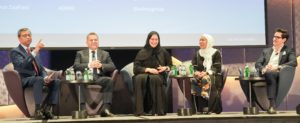MENA’s $1billion PR Industry Set To Double In Value By 2030
Fuelled by the rapid growth of the Middle East and North Africa (MENA) region’s National champion companies, the Public Relations (PR) industry in MENA is set to leapfrog in value to double its current size of $1billion by 2030, was the key take out from the PRovoke MENA Summit 2020, held in Dubai today.
PRovoke MENA Summit, organised by PRovoke Media (formerly The Holmes Report), is part of a global series of events that explore the innovation, disruption and evolution of the PR industry that is redefining influence and engagement across the globe.
The Summit opened with an insightful session ‘From National Heroes to Global Brands: Why the Middle East has emerged as a PR Powerhouse,’ moderated by Sunil John, Founder of ASDA’A BCW and President, Middle East of BCW. The panel hosted some of the region’s most respected and influential communicators: Boutros Boutros, Divisional Senior Vice President, Corporate Communications, Marketing and Brand, Emirates Airline and Group; Umayma Abubakar, Director of Internal Corporate Relations, Mubadala; Omar Zaafrani, Senior Vice President, Group Communications & Corporate Social Responsibility, ADNOC; and Huda Buhumaid, Chief Marketing Officer, Dubai Holding. The panelists explored how the regional PR landscape has grown, mirroring the transformation of National Champion companies such as Emirates, Mubadala, ADNOC and Dubai Holding into global brands.
Introducing the panel, Sunil John noted that the dramatic economic, social and political changes witnessed in MENA position the region as a strategic market for all global industries. The region will be at the centre of the world this year, with Expo 2020 Dubai, the G20 Summit meetings in Saudi Arabia, the upcoming World Bank IMF annual meetings in Morocco in 2021, the FIFA World Cup in Qatar in 2022 and other global events set to contribute to the regional PR industry’s continued growth.
“From US$500million a decade ago, the industry has upped its value to more than double that figure today and will further gain traction to double again by 2030. This will be driven by the growth of global brands that emerge from our region, especially from the two largest economies, Saudi Arabia and the UAE,” said Sunil John.
Highlighting the growth of Emirates, which today has a total communications budget of US$800 million, a team of 250 communications professionals, and working globally with 85 PR agencies, 100 advertising firms, and 30 digital and events management companies, Boutros Boutros said Public Relations continues to be the “most valuable, effective and affordable communications medium, which will continue to grow in the coming years.” Boutros said the Dubai office of Emirates plays the role of a, “global inhouse hub to manage all the different agencies, with the strategy and policies originating here.”
Umayma Abubakar said successfully communicating the Mubadala story is also a reflection of the vision of the UAE’s leadership. “Our government’s goal of economic diversification has positioned the UAE as more than an oil and gas economy. There is a compelling need to tell our story to the world, to show that we have a lot to contribute and add value. In this, it was important to be transparent, and to be perceived as a responsible global investor.”
Omar Zaafrani said the responsibility of national brands goes beyond their organisation and must represent a national perspective reflecting the UAE’s national branding and soft power. With a directional focus on making ADNOC, an oil and gas company, ‘cool’, Zaafrani said the challenge is to address the stereotypical stigma that is attributed to oil and gas sector players. “That takes courage, and a deliberate focus on humanising the story to make oil and gas relevant to the community.”
Dubai Holding’s Huda Buhumaid said there are interesting stories from this region and people are interested in knowing ‘how, why and when.’ “We are here ‘For the good of tomorrow’ and we change the landscape of Dubai through our different ventures. With over 400,000 people living in our real estate communities, more than 3 million people staying in our hotels, and with 11 business parks employing 95,000 people, we are promoting Dubai to the world – to the investors, tourists and residents – across various touch points.”
Concluding the session, Sunil John said communicating to a global audience is different from talking to a local audience. “The strategy needs to be truly global, cultural nuances understood with creativity playing a key role, supported by advanced data analysis. But innovative content and story-telling will continue to be at its heart.”








 Email: info@cyber-gear.com
Email: info@cyber-gear.com